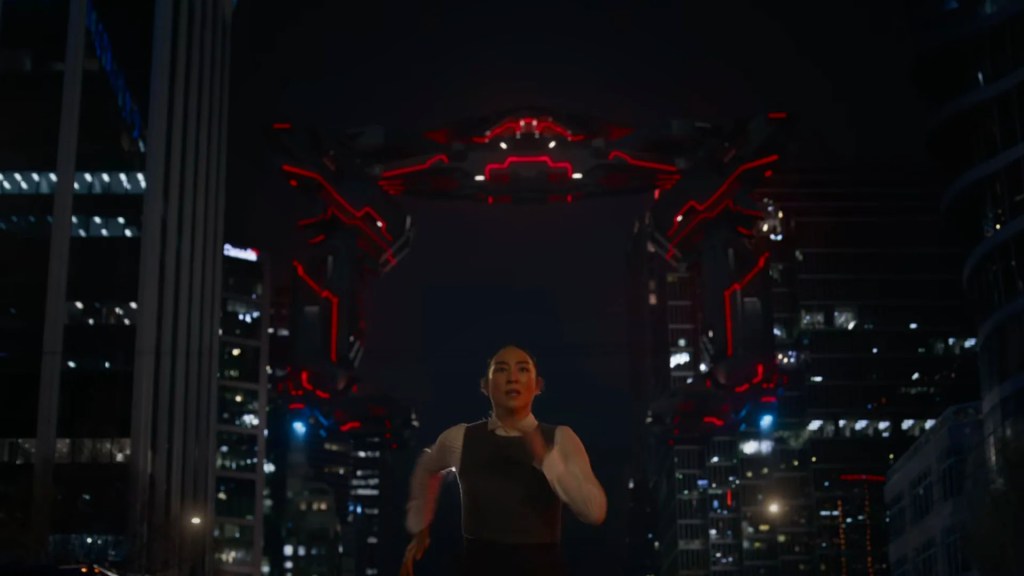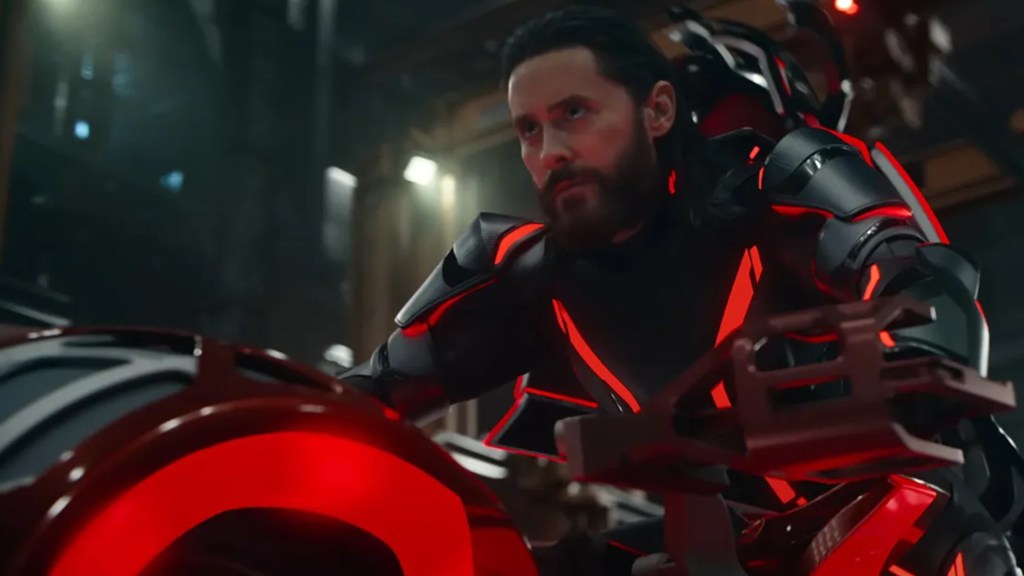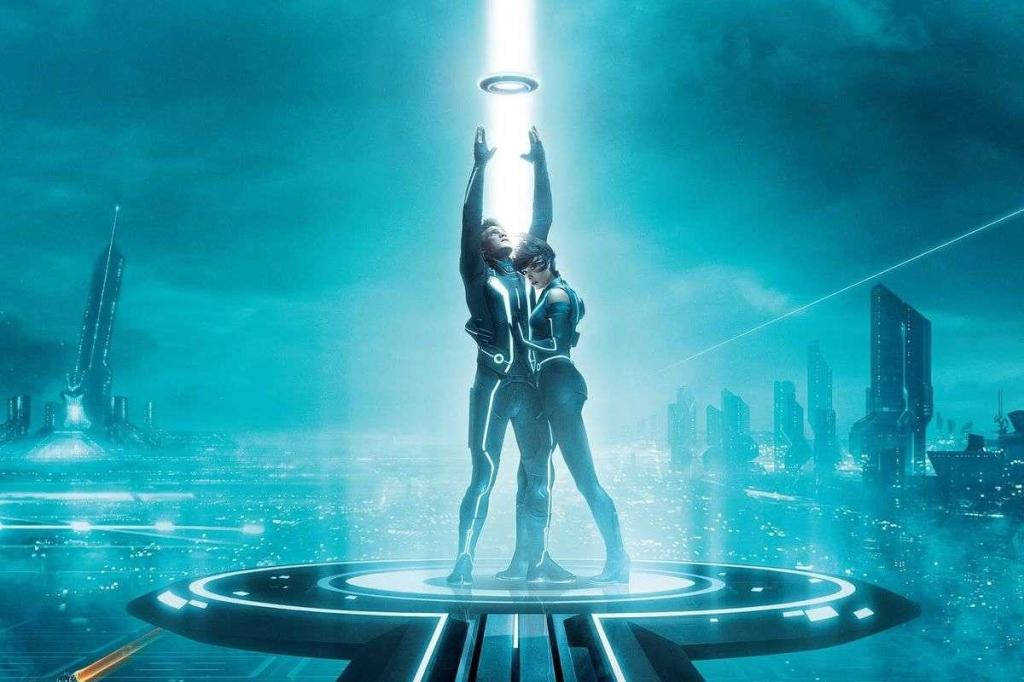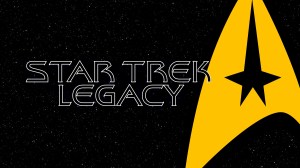Tron: Ares will be hitting theaters this fall, bringing fans the most ambitious chapter of the Tron series yet. The film will see a tech mogul named Julian Dillinger (Evan Peters) try to bring figures from Tron’s digital world of “The Grid” into the real world to serve as a renewable source of muscle and military might, using digital soldiers that can be reprinted as fast as they are deleted (read: killed). However, one advanced program, Ares (Jared Leto), can’t shake the memory of his former existence and threatens to break loose from the programming holding him in place, and may have his own mission to carry out.
Videos by ComicBook.com
ComicBook was invited along with other journalists to the set of Tron: Ares, where we got to speak with producer Justin Springer about a variety of subjects. We not only got to discuss the new vision for Tron: Ares, but also tried to probe our way into how this third Tron film will connect to Tron: Legacy, the sequel film that had one of the bigger cliffhanger endings of the 2010s.
How Tron: Ares Is Inspired By Alien First Encounter Lore

“All the way back to Legacy, I was talking to Steven Lisberger, the creator of Tron, about what he was thinking when he came up with the idea of Tron,” Springer explained. “And he was saying, in the late ’70s and early ’80s, there was an obsession with aliens, and we kept feeling like we were close to this first encounter. And he was like, I always, he was living around MIT, and there was a lot of computer, new technology being developed on campus there…He said, ‘I started thinking about what if intelligent life didn’t come from outer space, but it came from inside the machine, and what if we created it, and what would that be like?’ And I thought, that’s a great concept for a movie.”
“It’s really a first encounter film, more than anything else, and it’s not in outer space,” Springer continued. “But it’s from inside this machine, and we created it, and just because we created it, does that mean we can’t control it? And if we can, should we? You know, at what point does it become sufficiently advanced that it should be outside of our control?
How Tron: Ares Still Uses the “DNA” of Tron: Legacy‘s Abandoned Sequel

IN 2010, Top Gun: Maverick and F1 director Joseph Kosinski had his breakout hit with Tron: Legacy. The modest box office performance of Legacy ($409.9 million on a $170 million budget) muddied the waters, and the planned sequel, Tron: Ascension, languished in developmental limbo for years, even with Jared Leto attached. Tron: Ares may seem like a revised version of that Ascension concept, but Springer made it clear, “This is a new story, but in a recent interview, Joseph Kaczynski did mention… the fact that some of the DNA is in here. During the development process, was it a conscious decision to develop some of this stuff in Ascension, or was that just an organic thing that happened? It’s like, ‘Oh, well, now we really kind of have to cross-check here to make sure we’re not just copying everything.’”
“There are just ideas that we’ve always liked, and I developed that with Joe, and I developed this with Joachim Rønning before, and a lot of us did,” Springer continued. “And so, really, it’s always just been about that principal idea that I heard from Lisberger in 2010. That was conceptually what that movie was like, what Ascension would have been about, and then we abandoned a sequel at that point, but we kept the core concept, because we felt like that was still relevant.”
Why The Time Is Now For Tron: Ares

When Tron: Legacy hit in the 2010s, the world just getting into a mainstream stride with social media; now, we live in a world where an entire generation was raised on digital life, and AI is set for a world-shifting evolution any day now, the effects of which no one can accurately predict. According to Springer, that is the perfect window of opportunity for this particular Tron movie:
“I mean, one thing that’s interesting is that it’s been a very long time since the development process and a long time since Legacy, but the interesting thing is that with each year that has passed, the idea that doesn’t become dated actually becomes more relevant,” Springer explained. “Like, right now, this concept for a movie is more in the zeitgeist than it’s ever been, and so we’ve just been chasing that idea for a long time, not to mention just technologically the ability to produce a light cycle in the real world or do some of the visual effects that we’re talking about doing. It’s we’ll be able to do a better job now than we would have 10 years ago.
But yeah, there are definitely threads and ideas and set pieces and stuff from earlier development phases that we’ve just carried through that we’re finding their way into this movie because they’re on the concept that we’ve been on for a really long time.”
The End of Tron Legacy & Olivia Wilde’s Quorra Also Being in the Real World

One of the biggest reasons Tron: Legacy fans were hoping for a direct sequel to that film was due to its cliffhanger ending. The second Tron film revealed that a species of program called “isomorphic algorithms” (ISOs) had naturally come into existence within the Grid, and flourished in their digital evolution. At the end of the film, young Sam Flynn (Garrett Hedlund) escaped the Grid with the last ISO, Quorra (Olivia Wilde) in his company, bringing the revolutionary program into the real world. The impact of that crossover was something that was originally set to be explored in the third film, leaving many wondering how, or even if, Tron: Ares will address it.
“We’re not telling that story right now…in deciding to move forward to a new story. But we’re not undoing that either, so it’s still out there,” Springer cryptically teased. “But this story is about, like, in terms of it, because, yeah, it’s just, it’s cleaner to tell. We’re basically starting in the same space where it’s a character coming to this world, and what will his experience be through this story? And so it’s not meant to undo the end of Legacy. It’s just not continuing that story. It’s still in the world. It still happened. We’ll just say that….It still happened. And there’s nothing we’re doing to say that it didn’t. And there’s things in the DNA that keep it alive, even in our story.”
If we had to interpret that response, based on Tron: Ares trailers, we’d go with the theory that Quorra’s crossing over was eventually discovered by tech-savvy forces in the real world, leading to the reverse-engineering of that process, resulting in digital soldiers, like Ares, being manifested in the real world. That would arguably honor the legacy of Legacy, without requiring any direct connection to that story, or cameos from other cast members, besides Jeff Bridges’ Flynn.
Tron: Ares will be released in theaters on October 10th.









